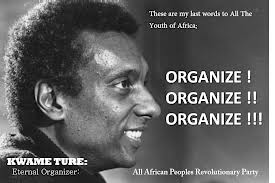Kwame Turé, (b. Stokely Carmichael, Trinidad) (1941-1998) is remembered on the 15th anniversary of his death in this special issue of Pambazuka News. Articles,videos and audios highlight his ideological perspicacity and Pan-Africanist convictions and give personal insights by those who met and worked with one of the most notable African revolutionaries.
‘The charisma, warmth and magnetism’ of Kwame Ture were undeniable as Ekwueme Michael Thelwell, who helped edit Ture’s autobiography, points out. His smile was infectious.
Kwame Ture – born to Trinidadian parents – was passionately committed to ordinary African people across the globe, whether in the Diaspora or on the motherland. He spent 30 years of his life living on the African continent in Guinea Conakry.
TENETS OF TURE’S PAN-AFRICANIST IDEOLOGY
As a new generation of Africans have emerged, that is, the youth of the Diaspora and of continental Africa, they need to revisit the political convictions, practical work and Pan-Africanist thought of Kwame Ture. He was a magnificent communicator in the same league as skilled orators such as Malcom X, Thomas Sankara, Jean Bertrand Aristide, Fidel Castro and Tajudeen Abdul Raheem – who could speak at great length without notes and with amusing wit. Therefore we carry several short and lengthy video clips in which Kwame Ture can be heard, seen and evaluated. However, there are many lengthy interviews, speeches and lectures given by this stalwart of African unity and the necessity of organisation among African people. The unification of Africa under scientific socialism was an objective that Ture waged an unrelenting struggle for as well as imploring Africans wherever he went in the Pan-African world to organise to overcome their oppression and achieve African liberation. He did not believe that capitalism, the vulturistic and dehumanising system that it was, could be reformed. It had to be totally destroyed and an egalitarian economic system of socialism built in place of capitalism that had been built on the backs of enslaved African people, the indigenous people of the Americas as well as the European working classes.
Click HERE for special issue of Pambazuka News on Kwame Turé















